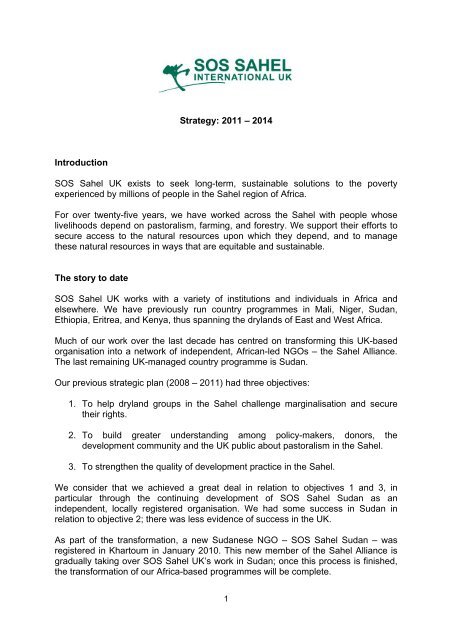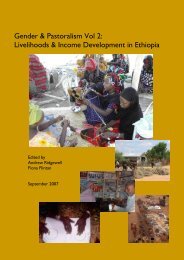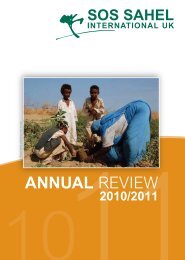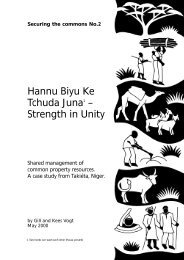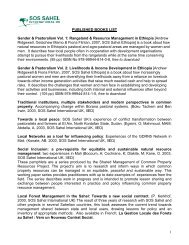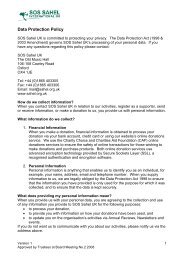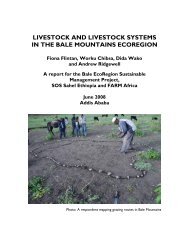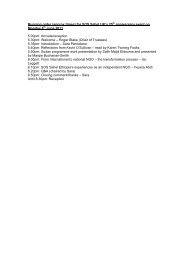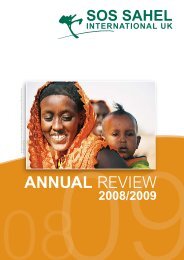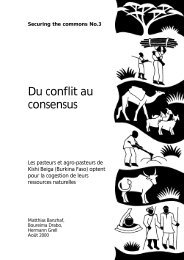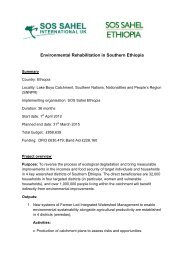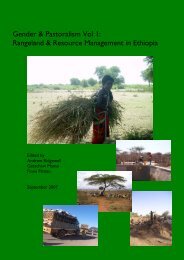Read them here - SOS Sahel
Read them here - SOS Sahel
Read them here - SOS Sahel
You also want an ePaper? Increase the reach of your titles
YUMPU automatically turns print PDFs into web optimized ePapers that Google loves.
Strategy: 2011 – 2014<br />
Introduction<br />
<strong>SOS</strong> <strong>Sahel</strong> UK exists to seek long-term, sustainable solutions to the poverty<br />
experienced by millions of people in the <strong>Sahel</strong> region of Africa.<br />
For over twenty-five years, we have worked across the <strong>Sahel</strong> with people whose<br />
livelihoods depend on pastoralism, farming, and forestry. We support their efforts to<br />
secure access to the natural resources upon which they depend, and to manage<br />
these natural resources in ways that are equitable and sustainable.<br />
The story to date<br />
<strong>SOS</strong> <strong>Sahel</strong> UK works with a variety of institutions and individuals in Africa and<br />
elsew<strong>here</strong>. We have previously run country programmes in Mali, Niger, Sudan,<br />
Ethiopia, Eritrea, and Kenya, thus spanning the drylands of East and West Africa.<br />
Much of our work over the last decade has centred on transforming this UK-based<br />
organisation into a network of independent, African-led NGOs – the <strong>Sahel</strong> Alliance.<br />
The last remaining UK-managed country programme is Sudan.<br />
Our previous strategic plan (2008 – 2011) had three objectives:<br />
1. To help dryland groups in the <strong>Sahel</strong> challenge marginalisation and secure<br />
their rights.<br />
2. To build greater understanding among policy-makers, donors, the<br />
development community and the UK public about pastoralism in the <strong>Sahel</strong>.<br />
3. To strengthen the quality of development practice in the <strong>Sahel</strong>.<br />
We consider that we achieved a great deal in relation to objectives 1 and 3, in<br />
particular through the continuing development of <strong>SOS</strong> <strong>Sahel</strong> Sudan as an<br />
independent, locally registered organisation. We had some success in Sudan in<br />
relation to objective 2; t<strong>here</strong> was less evidence of success in the UK.<br />
As part of the transformation, a new Sudanese NGO – <strong>SOS</strong> <strong>Sahel</strong> Sudan – was<br />
registered in Khartoum in January 2010. This new member of the <strong>Sahel</strong> Alliance is<br />
gradually taking over <strong>SOS</strong> <strong>Sahel</strong> UK’s work in Sudan; once this process is finished,<br />
the transformation of our Africa-based programmes will be complete.<br />
1
In support of <strong>SOS</strong> <strong>Sahel</strong> Sudan, we have developed the capacity of their Board of<br />
Trustees and staff such that they are now recognised as one of the most competent<br />
national NGOs in Sudan.<br />
As the nationalisation of our country programmes has neared completion, we have<br />
transformed <strong>SOS</strong> <strong>Sahel</strong> UK from an implementing NGO to a facilitating NGO. We<br />
have striven to work in equal partnership with national NGOs, acknowledging that<br />
relationships between international and national NGOs have, historically, been<br />
unequal.<br />
We have restructured the organisation to focus resources mainly on Sudan, and to<br />
reduce the UK cost base. We have managed our finances reasonably effectively,<br />
although t<strong>here</strong> is still little margin of safety, and the funding of the UK operation has<br />
remained a challenge. The Board of Trustees has restructured itself in response to<br />
these changes.<br />
Context<br />
All of this was done in a rapidly changing international environment.<br />
Globally, despite progress towards the Millennium Development Goals, sustainable<br />
and equitable development is under threat from increased pressure on land and<br />
water resources, climate change, and other challenges.<br />
Moreover, the banking crisis and recession, and declining support for development<br />
spending, have led the OECD donor countries to take a more defensive and shortterm<br />
view of development. In particular, t<strong>here</strong> is now a strong emphasis on results, in<br />
the form of concrete and measurable outcomes, and value for money. This is forcing<br />
civil society organisations to put more resources into monitoring and compliance, at<br />
a time when the total value of development assistance is diminishing.<br />
Regionally, t<strong>here</strong> is continuing political instability. T<strong>here</strong> have been popular uprisings<br />
in Egypt, Libya, and elsew<strong>here</strong>, and many countries in the <strong>Sahel</strong> are regarded as<br />
fragile states. Sudan has remained politically unstable following the secession of<br />
South Sudan in July 2011, and is host to severe internal conflicts. South Sudan is<br />
also experiencing widespread internal violence. T<strong>here</strong> is growing tension between<br />
the Governments of Sudan and South Sudan over unresolved issues relating to the<br />
secession of South Sudan.<br />
2
W<strong>here</strong> do we go from <strong>here</strong><br />
We are now well placed to maintain a facilitating role. So what will we do, and how<br />
will we do this<br />
Sudan<br />
The process for independence of <strong>SOS</strong> <strong>Sahel</strong> Sudan is continuing, and we wish to<br />
complete this successfully. As part of this process, <strong>SOS</strong> <strong>Sahel</strong> Sudan has developed<br />
its own measures of success. These include having:<br />
• effective programmes of work;<br />
• effective local capacity to govern, manage and support the organisation and<br />
its work; and<br />
• recognition as a leading national NGO in Sudan and good relationships with<br />
relevant government departments;<br />
• continuous, and diverse, funding streams.<br />
However, the most important milestones for <strong>SOS</strong> <strong>Sahel</strong> UK will be:<br />
• the point at which the formal presence of <strong>SOS</strong> <strong>Sahel</strong> UK in Sudan is no longer<br />
required, such that we can deregister as an INGO t<strong>here</strong>; and<br />
• the transfer of remaining employment contracts from <strong>SOS</strong> <strong>Sahel</strong> UK to <strong>SOS</strong><br />
<strong>Sahel</strong> Sudan; in particular, the transfer of the contract of the Executive<br />
Director.<br />
We consider that we can reach these milestones no later than March 2014. To<br />
achieve this, we will:<br />
• deliver work against all existing grants effectively, responsively, within<br />
budget and on schedule, and meet the reporting requirements, as far as<br />
is practicable in a fragile and rapidly changing context;<br />
• work together with <strong>SOS</strong> <strong>Sahel</strong> Sudan to meet co-financing commitments<br />
related to these grants;<br />
• assist <strong>SOS</strong> <strong>Sahel</strong> Sudan to close skills gaps in governance,<br />
management and administration;<br />
• encourage <strong>SOS</strong> <strong>Sahel</strong> Sudan to build reserves, through advice and<br />
guidance on fundraising, budgeting, and organisational development;<br />
and<br />
• conclude the transfer of contracts.<br />
3
Other countries<br />
Ethiopia: we were awarded funding in 2011 for a joint three-year project with <strong>SOS</strong><br />
<strong>Sahel</strong> Ethiopia from DFID and the Band Aid Charitable Trust. We will:<br />
• support <strong>SOS</strong> <strong>Sahel</strong> Ethiopia to manage the project effectively, and<br />
ensure that reporting requirements are met.<br />
South Sudan: <strong>SOS</strong> <strong>Sahel</strong> South Sudan is registered in that country as an NGO, and<br />
has obtained funds for start-up. We will:<br />
• assist <strong>SOS</strong> <strong>Sahel</strong> South Sudan to establish and run itself competently<br />
and accountably as a national NGO.<br />
Multinational: development issues know no borders. T<strong>here</strong>fore, we will:<br />
UK<br />
• encourage and support learning and exchange of development practice,<br />
in particular between Sudan, South Sudan and Ethiopia, and more<br />
generally, in sub-Saharan Africa.<br />
We will:<br />
• argue the case in the UK and with donors for continuing support to our<br />
beneficiaries and partners in Sudan and South Sudan;<br />
• maintain appropriate skills in the UK office for its changing role;<br />
• build reserves, so that we can manage uncertainties effectively; and<br />
• ensure that the Board is able to carry out its role effectively.<br />
Review<br />
We will:<br />
• review our performance against this strategy in 2014, and reflect on our<br />
purpose in a changing world; and<br />
• document and share our learning from our experiences over the past ten<br />
years.<br />
4


